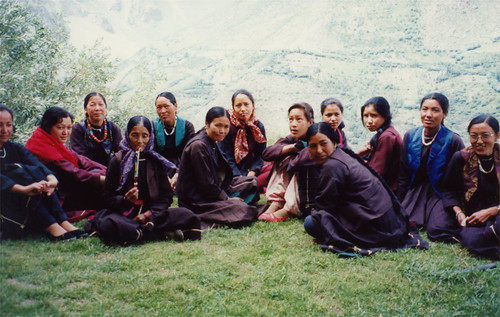It’s time to leave Leh. I consider flying, but eventually plump for the bus journey to Manali instead. There’s five of us, all from the Ti-Sei lodge, all heading to untimately to Delhi. This requires an early start, still dark and cold, the only light coming from the stars. It’s difficult to describe how absolute the darkness is here, how accustomed we’ve become to at least some form of illumination. Heading for the bus station, I trip over one of the many mountain dogs that lie around the streets here. It starts to bark, and others answer, and soon the whole town is full of barking, howling dogs.
The trip to our next stop is eighteen hours long, but there have been worse journeys. A highlight is stopping at Taglangla Pass, at the time the highest navigable pass in the world. It’s marked by a sign proclaiming “TAGLANGLA. ALTITUDE 17582 FT. You are passing through second highest pass of the world. Unbelievable is not it?”. The air is thin here, the sky ranged to a blue density, and we feel giggly, and excited, as though we’ve shorn our years and have returned to our childhood. It’s only later that I realise that it’s probably down to oxygen starvation.
Lowlights: the roads and very, very narrow here, and there’s a sheer, bowel-clenching drop down the mountainside. “It’s safe,” Emilijana assures me, “The drivers are used to travelling here.” In complete contradiction, we pass the wreckage of three buses, compacted, lying far blow. Once we almost join them as the rear wheels of the bus go over the edge (and it’s a rear wheel drive). Another time, the door swings open, and the bus conductor goes swinging out over the edge, hanging on to the door handle, before the bus turn a corner and gravity pulls him back in. I almost miss this, only prompted a collective scream that comes from all the other bus occupants.
Finally we arrive at our overnight stop, in Keylong. It’s lushly green here, in almost complete contrast to Leh. We collapse into our tents, and fall into a scarily deep sleep, only to be woken in the early morning by a hindi pop song blasting out at horrendous volume from a nearby building.
We discover it’s Independence Day, and all the locals are in holiday mode. Emilijane drags me off to yet another bloody gompa, far up the mountainside, and while the building’s unremarkable, the view is astounding. A group of women are there, dressed in traditional costume, who ask for their photo to be taken. The majority of them are studying at university. Traditional dress is primarily worn by women in India, as the men plump for the naffest of western clothing, the sort that would get you stoned on the street if you were to wear it in the UK. On the way back down we take a detour through the local village, resonant with the small of mud and cow shit, and ooh and aah over the cute yak calfs perched on the side of buildings. The buildings here are very much of a traditional design, although there’s sign of modernisation in the form of a solar powered water heater for common use, where the villagers wash their clothing.

The second-last stage oufrour journey takes us to Kullu. It’s less traumatic this time, although Emiljana doesn’t agree, as she’s constantly being pushed out of her seat by Ian, another one of our party of five, who’s ill, and who keeps on dozing into a semi-feverish sleep. The approach into Manali is seen through a landscape misty and verdant, with quite the most beautiful scenery I’ve come across in India, forested, with sheer waterfalls spilling downwards. This isn’t our destination though: that’s Kullu, which appears to be full of mutant-size vegetation, and equally oversized wildlife. The bats (numerous here) are bigger than gulls. The insects have obviously been subjected to some sort of growth hormone. One, some sort of flying beetle, screams when you touch it.
Then, finally, four days after leaving, we reach Delhi. It’s crowded and hot and smelly and chaotic, and even though we’ve all been here more than once before, it seems like another world.
No comments:
Post a Comment